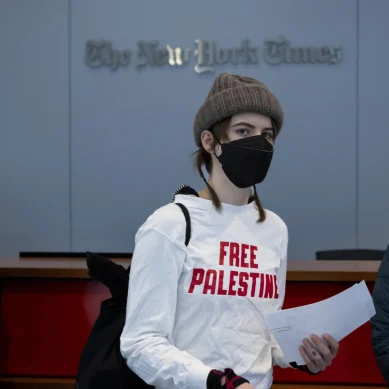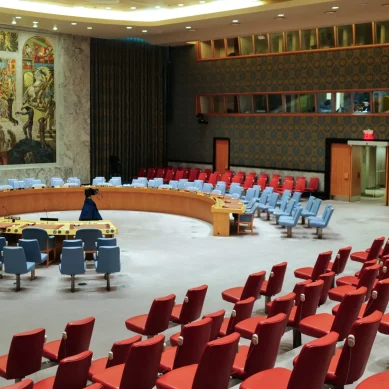
Facebook has faced a backlash from publishers and politicians after blocking news feeds in Australia in a surprise escalation of a dispute with the government over a law to require it to share revenue from news.
Facebook wiped out pages from Australian state governments and charities as well as from domestic and international news organisations, three days before the launch of a nationwide Covid-19 vaccination programme.
Although the measure was limited to Australia, European publishers along with British and Canadian politicians described it as an attempt to put pressure on governments that might consider similar measures.
“Facebook’s actions to unfriend Australia today, cutting off essential information services on health and emergency services, were as arrogant as they were disappointing,” Australian Prime Minister Scott Morrison wrote on his own Facebook page.
“These actions will only confirm the concerns that an increasing number of countries are expressing about the behaviour of Big Tech companies who think they are bigger than governments and that the rules should not apply to them.”
Canadian Heritage Minister Steven Guilbeault, who is drafting legislation to make the platforms pay for using media content, said Facebook’s move was “highly irresponsible.”
“It won’t deter us from moving ahead,” he said in remarks to reporters.
The dispute centres on a planned Australian law that would require Facebook and Alphabet Inc’s Google to reach deals to pay news outlets whose links drive traffic to their platforms, or agree on a price through arbitration.
A Facebook spokeswoman said that chief executive Mark Zuckerberg had “a constructive call with Australian Treasurer Josh Frydenberg and again expressed our disappointment with the proposed law.” She said Facebook would continue to engage with the governments on amendments to the law.
Facebook said it had blocked a wide swathe of pages because the draft law did not clearly define news content. It said its commitment to combat misinformation had not changed and it would restore pages that were taken down by mistake.
“As the law does not provide clear guidance on the definition of news content, we have taken a broad definition in order to respect the law as drafted,” a company spokesman said.
Facebook used its machine learning tools to identify news on the site to enforce the Australia action that blocked everything from news and government websites to its own site in Australia at one point.
Benedict Evans, a digital media analyst and former partner at venture capital firm Andreessen Horowitz, said the argument that Facebook would willingly pay for news article links on its platform if not for its dominance is misguided, and no other website pays publishers to link stories.
“There is wilful blindness to this logic,” Evans wrote in a blog post. No-one has ever paid to link, regardless of their market power.”
The head of the British parliamentary committee overseeing the media industry, Julian Knight, said the message was aimed far beyond Australia.
“This action – bully boy action – that they’ve undertaken in Australia will I think ignite a desire to go further amongst legislators around the world,” Knight said.
“I think they’re almost using Australia as a test of strength for global democracies as to whether or not they wish to impose restrictions on the way in which they do business,” he said. “So, we’re all behind Australia in my view.”
News publishers saw Facebook’s tactics as evidence that the company, which also owns Instagram and WhatsApp, cannot be trusted as the gatekeeper for their industry.
Henry Faure Walker, chairman of Britain’s News Media Association industry group, said banning news during a global pandemic was “a classic example of a monopoly power being the schoolyard bully, trying to protect its dominant position with scant regard for the citizens and customers it supposedly serves.”
The head of Germany’s BDZV news publishers’ association, Dietmar Wolff, said: “It is high time that governments all over the world limit the market power of the gatekeeper platforms.”
Publishers say platforms such as Google and Facebook hoard the bulk of revenue as media shifts online as print and broadcast advertising shrivels, forcing newspapers and TV and radio stations to scale down newsrooms or shut.
Google has complained that Australia’s rules go further than new revenue-sharing laws in parts of Europe because they would apply even to links and snippets of articles, which it says limits internet users’ free speech.
Still, Facebook’s action in Australia represented a tactical split with Google. They had campaigned together against such laws and both threatened to cancel services in Australia, but Google sealed pre-emptive deals with several media outlets in recent days.
Rupert Murdoch’s News Corp was the latest to announce a deal in which it will receive “significant payments” from Google to provide content for the search engine’s News Showcase account.
Facebook drew particular condemnation for including in its blackout charity accounts and major state governments, including those providing advice on the Covid-19 pandemic and bushfire threats. Some were later restored.
Facebook said the planned Australian law, expected to be passed by parliament within days, “fundamentally misunderstands” the relationship between itself and publishers and it faced a stark choice of complying or banning news.
The tech giant has said news makes up just four per cent of what people view on its website. But for Australians, Facebook’s role in news delivery is growing. A 2020 University of Canberra study found 21 per cent of Australians use social media as their primary news source and 39 per cent of the population uses Facebook to receive news.
With professional journalism blacked out, “Facebook has exponentially increased the opportunity for misinformation, dangerous radicalism and conspiracy theories to abound on its platform,” tweeted Lisa Davies, editor of The Sydney Morning Herald newspaper.
- A Reuters report











